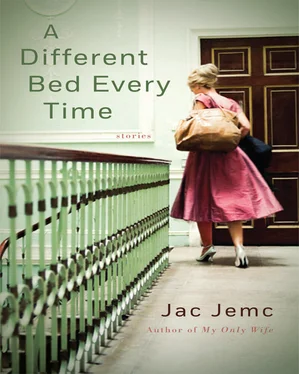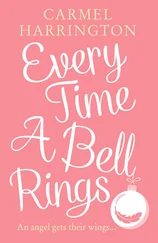Jenny, with her wasp waist and breath like stinging lemons. Jenny’s husband is very ill. Full, alienated clauses of time are being pulled through IVs, sucked into his life-thirsty body. Jenny thinks, “Maybe my mid-gut will quit before his,” and quickly stops her thoughts.
Six children bang the ground around her. Six children who have emerged from her thorax: newfangled, right-handed. Six glorious exits that became entrances.
The swinging fraudulence of “forever” brushes the side of her face again and again and again, rubbing it raw. She is surrounded, albeit alone, with six beehive minds, quick to omit the worst facts.
Friends travel into his room to make blank truces, lastditch efforts to make indelible marks on him.
Jenny’s eyes, full of so many angles, sense the world framing these instants for her memory. She is compelled to doubt almost everything. She often misses the point. Some foreign filmmaker’s mind is converting everything to images.
Summer is spent in a carefully air-conditioned laboratory of a room.
Time quickens. The silt of everyday encounters adds up to more. Six weeks drop away, leave Jenny so tired she doesn’t have the energy or space to flap her wings into flight. Her balance is off. She is heavy with the loneliness that awaits.
Then, one day, an anonymous deliveryman arrives with cases of an expected yet unknown substance. As her husband turns back to make sure she follows him, his breath halts. Simple marching songs play in the air. She doesn’t care to concern herself with the truth. Not even a single question presents itself. This moment has been living within her for months.
This darkness cradles the room until the light of six unborn stars bursts in to shine full sentences of future upon her.
Before We Pass This Way Again
The final sight of him almost went unnoticed. She might have said “Thank you” rather than “Farewell,” but by then Louie knew her own mind. She recognized the sound of him leaving for what it was.
When it came down to just the two of them, they went to McDonald’s almost every day. Louie got good at faking what a treat it was. Her father’d flip in the Townes van Zandt tape as they pulled out of the driveway. He knew the importance of consistency. To Louie, this meant they’d known each other a long time. Louie even silently picked them a song—“Be Here to Love Me Today.” When the first chords of this song sounded, her father’s hand always went to the volume knob, twisted it clockwise. They both sang along. Louie’s father got a word wrong, mistook one verse for another, and hummed the rest of the line like he meant it.
Him eating a Big Mac, her chicken nuggets, he gave her advice, probably because he didn’t know what else to do. Most of the time it was completely unrelated to the trials of growing up appropriate to Louie’s age: “Never be grateful to a boy. He’s benefiting from the deal, and if you play it right, he’ll be grateful for whatever attention you give him. He’s the one should be grateful to you.” Louie nodded her head solemnly, unblinking. She didn’t like to talk to boys. She didn’t want to ask what deal her father was talking about.
With her father, she didn’t go to church on Sundays anymore. They slept late and they headed out to the cemetery first thing. Louie kicked freshly cut grass from the headstone and it clung to her patent leather shoes. “Why do women die?” she asked her father. He shook his head like he missed her mother too. After a moment, he’d take her hand and lead her back to the truck. They drove in silence to the bar. That was just the way he did things: cheap fast food to eat and top-shelf liquor for drinking.
“Do you remember your mama?” he asked as he pulled out the bar stool for her. Louie wished he’d asked at the cemetery. At her mother’s grave, her head had been clear with grass and sunshine; here she felt dizzy with the yeasty smell of old beer and the ammonia they used to try to scrub it away. She answered, though, because he hardly ever asked about her mama. “Of course. It hasn’t even been a year yet, Daddy.” Her father nodded at this and then looked down the bar. The bartender headed toward them, stopping to pour a Coke and scoop a dozen cherries into a cocktail glass for Louie. The bartender then looked at her father. “Jack?” was all she said and he nodded. He didn’t need to say much because he never really changed.
Her grandparents wanted to see her. It’d been months, they said. They wanted to make sure she was clean and eating well. Really, though, they missed their daughter and wanted to see what remained of her. To ensure the safety of that last little bit. They’d never trusted Louie’s father.
He brought Louie out to their farm. The dust from the truck still settling, Louie hopped to the ground and ran to her grandparents.
Why he stuck around was anyone’s guess. They all assumed he’d slow down to let Louie out and return to pick her up when she was ready to come on home. It was summer; Louie had nowhere to be. She could stay all season, if she wanted.
After dinner one night her father nudged Louie’s knee with his own. “Sing for your grandparents.”
She looked up from her cobbler, terrified.
“She’s got a real pretty voice.” He nodded at his mother- and father-in-law. It was probably the first he’d spoken since they’d arrived. Everyone seemed a little stunned. Louie’s grandparents looked at her expectantly because they didn’t know how to look at her father.
“Go on, Lou. You know the one I like.” He placed his big, rough hand on the table and began to drum it lightly. Right away she knew it was the song she’d claimed as their own. She started crying. Everyone thought it was because she didn’t want to sing.
The next morning, her father and grandfather drank coffee on the porch while Louie chased the cat around the yard. Her grandmother sat on a swing that still hung from a branch of the tree out front. She snapped her old Polaroid camera, all of the pictures coming out golden.
The cat ran beneath the porch and Louie fell to the ground, exhausted. Her grandmother called to her, “Come here and sit on my lap, Louise. You’ll get your new dress all dirty.” She was too big for her grandmother’s lap, but Louie went to her anyway. Her grandmother leaned down to lift her and Louie kissed her cheek and escaped behind the swing to push her grandmother’s ample behind. “Louise! I’m too heavy!” Louie continued though, and her grandmother laughed at her feeble attempts.
After a walk down the road to visit the horses at the neighbor’s stable, the four of them drove into town for lunch. At the diner, Louie examined the menu carefully and asked if she could order spaghetti for lunch. Her grandfather kissed her forehead and said, “Anything you want.”
Louie pressed her luck and asked for a milkshake as well.
“With your spaghetti?” her grandmother asked. Louie didn’t know how to answer, so she didn’t, but her grandfather repeated himself. “Anything you want.”
When the waitress came again, Louie ordered and her father said, “I’ll have the same.”
Everyone looked at him with lifted eyebrows, but no one said a word.
The silence was long after the waitress left. “Sing for your grandparents? Please, Lou?” Her father didn’t pose it as a command this time; he asked her.
Louie had stayed up half the night preoccupied with the thought of singing. Now that her father made the request again, she felt that with a little time she could get up the courage to do it. She needed a moment to gather herself and in that moment her grandparents took her silence for fear and began bickering about whose turn it was to sweep the porch once they got back to the farm.
Читать дальше












